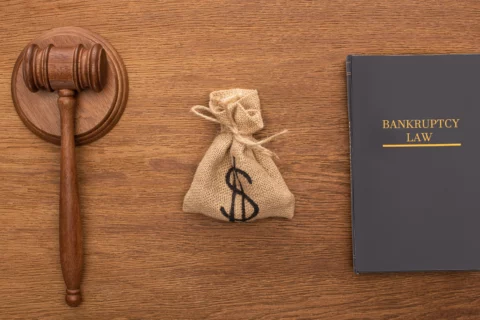Bankruptcy Filing in Illinois
A person or company who is unable to pay back any outstanding debts to creditors may opt to file bankruptcy as the last resort to solve debt problems. Filing bankruptcy will allow you to reorganize your finances, pursue debt settlement, and pay off a creditor. This is an opportunity for a bankrupt person to have a fresh start and obtain financial freedom.
There are different types of bankruptcy that you can choose from depending on your financial situation. These bankruptcy options are commonly known as Chapter 7 and Chapter 13. The first step of the bankruptcy process is to identify which bankruptcy chapter will be the best solution for your financial problems.
Bankruptcy laws may vary from state-to-state. In Illinois, there are certain guidelines that you need to follow when declaring bankruptcy. You need to know how to file and fill out the official bankruptcy form, pass the means test, protect your assets from liquidation, take credit counseling sessions from an accredited counselor, and coordinate with the Illinois bankruptcy court.
You may begin your bankruptcy filing by accomplishing the free and official online bankruptcy form from the website of the United States Bankruptcy Court. You need to fill out the form with the complete details of your current financial situation. You need to declare all your assets, liabilities, monthly income, living expenses, bank account information, credit card debt, loan debt, and property transactions. A credible Aurora bankruptcy attorney can assist you in such filing. You need to ensure that all information and figures in your paperwork are accurate before you submit it to the local court.
When a person files for bankruptcy, it is required for them to pass the bankruptcy means test. This test is done to check if you will qualify for the bankruptcy chapter that you will file.
 In Chapter 7 bankruptcy, you will pass the “means test” if you meet the standard income requirements. The initial screening identifies the level of your household income. If your income is lower than the state’s median income, then you are qualified to be granted a discharge from the Chapter 7 case. The second screening will determine your approved expenses and deduct them from your income. If the deduction has been made and there will be no sufficient disposable income left to be used for debt repayment, then you will be eligible for Chapter 7 bankruptcy.
In Chapter 7 bankruptcy, you will pass the “means test” if you meet the standard income requirements. The initial screening identifies the level of your household income. If your income is lower than the state’s median income, then you are qualified to be granted a discharge from the Chapter 7 case. The second screening will determine your approved expenses and deduct them from your income. If the deduction has been made and there will be no sufficient disposable income left to be used for debt repayment, then you will be eligible for Chapter 7 bankruptcy.
In Chapter 13 bankruptcy, you may pay back some or the full amount of what you owe under a repayment plan if your income exceeds the limits of Chapter 7. The most important factor to consider in filing Chapter 13 is sufficient monthly income to wipe out your debts. The bankruptcy payment for Chapters 7 and 13 are calculated similarly. You are required to pay the non-exempt property value and the amount of your non-dischargeable debt. In case you want to make amendments in choosing the bankruptcy chapter, it is possible to change from Chapter 7 to Chapter 13 as long as you can reduce the length of the payment plan down to three years.
Before you decide on the bankruptcy chapter that you will file, you need to know the guidelines on how you can protect your assets and properties from liquidation. Bankruptcy does not mean you will lose everything that you have. According to the Illinois bankruptcy exemption law, there are certain assets that you can protect from being liquidated depending on the bankruptcy chapter that you will choose. On the other hand, some assets cannot be protected and these are categorized under a non-exempt property.
If you choose to file Chapter 7, your bankruptcy trustee will be in charge of selling your non-exempt property. The proceeds will be distributed to your creditors according to the bankruptcy payment rules. On the contrary, filing Chapter 13 bankruptcy will allow you to keep your property; however, you need to pay back the non-exempt property value to your creditors under the repayment plan guidelines within three to five years.
In Illinois, there is a state law that allows you to file a homestead exemption. This type of exemption allows you to protect your residential property for the maximum coverage worth $15,000. If you decide to sell your house, you are allowed to exempt the proceeds within a year.
Bankruptcy exemptions also apply to your motor vehicle. You are allowed to exempt a maximum amount of $2,400 of equity for one vehicle. Another type of exemption, also known as “wildcard exemption”, can be applied to your luxury or personal property (other than real estate) for a maximum value of $4,000. This amount may also be added to other exemptions. For instance, you may add this amount to your motor vehicle exemption for you to be able to keep a car with a much higher value.
As part of the bankruptcy process, you are required to take financial courses from accredited credit counseling agencies. It is mandatory to take credit counseling sessions before bankruptcy filing and a debt management course after the bankruptcy filing.
Once you have completed the paperwork and other requirements, you may submit it to the local court assigned to your district with the help of a credible Aurora bankruptcy lawyer. Illinois has three federal judicial districts and each has a bankruptcy court. When you submit your bankruptcy filing, you need to settle the bankruptcy filing fee or apply for a fee waiver.
Bankruptcy filings are considered to be complex and complicated; however, your efforts will be worth it in the end. Being bankrupt and dealing with debt should not stop you from trying to start over again. Bankruptcy will allow you to look for ways to restructure your finances and help you stay out of debt. You need to have basic knowledge about bankruptcy rules to avoid errors. For legal help, do not hesitate to contact our experienced Aurora bankruptcy lawyers at Cutler & Associates, Ltd. We will help you achieve the financial freedom that you deserve.


